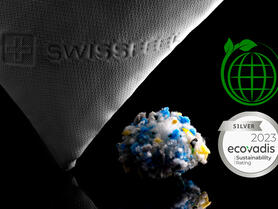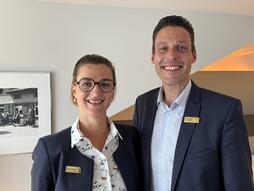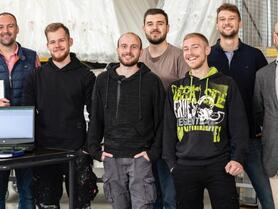
News
Hotelier – Saving the CO2 Balance?
15.04.2023
Hotelier – SLEEP / THE HOTEL BED (Part 1/3)
Carpe noctem – Missed opportunities or finally waking up? ByJens Rosenbaum

A look at the hotel industry shows that the quote by Quintus Horatius Flaccus, "carpe diem" (seize the day), is fully embraced here. During the day, guests are offered a wealth of services, which also help define a hotel's profile. But what about the night, "noctem"? That period when the guest, between check-in and check-out, is horizontally positioned. For this, a bed is logically essential—after all, without beds, there are no guests. Yet, precisely because the "hotel bed" may initially sound so mundane, its untapped potential is often overlooked.
What leverage the hotel bed offers for many of the industry's challenges, especially current ones, is significant. Alongside the highly relevant topic of sustainability, these challenges include perennial cost concerns and, of course, the eternal quest for optimal sleep comfort. The latter, despite being the core service of the hotel industry, has unfortunately become a secondary consideration in many hotels over time. As a result, the guest experience in this regard is often subpar.

Saving the CO2 Balance
The abbreviated quote from Giacomo Girolamo Casanova (1725–1798), "Who sleeps, does not sin...", originates from a time when no one could have imagined that the principle of sustainability, first introduced by Hans Carl von Carlowitz (1645–1714), would one day permeate every aspect of life. Today, even sleep is scrutinized for its sustainability. The chemical formula CO2 has become the benchmark, allowing us to quantify and compare which measures and products contribute to sustainability. Keywords like circular economy capability, sustainable product use, and the avoidance of single-use or disposable items are at the forefront. Meeting these demands often requires a shift in mindset, a break from old habits, and changes in purchasing and usage behavior.
CO2 in the Bed
Surprisingly, the hotel bed harbors significant CO2-saving potential. Anyone working on their CO2 balance should take a closer look under the covers. To put things into perspective: the Swiss hospitality industry, with its approximately 4,000 establishments, operates around 500,000 mattresses (based on a standard size of 80/90×200 cm). Each mattress accounts for an average CO2 footprint of approximately 60 kilograms during production. After five to eight years, a hotel mattress is typically replaced, adding another 60 kilograms of CO2 for the new mattress and about 9 kilograms of CO2 from incinerating the old one, as used mattresses are incinerated in Switzerland, mainly for hygiene reasons.
However, incineration not only adds to CO2 emissions but also destroys valuable resources. The recovery of energy, often offset to make the CO2 impact appear less severe, is unnecessary in Switzerland, where over 80% of the energy mix is already climate-neutral. Incineration, therefore, worsens the CO2 balance unnecessarily.
Durability and Hygiene
Currently, approximately 80,000 mattresses are replaced and disposed of annually in Switzerland’s hospitality sector, resulting in an environmental burden of around 5,000 tons of CO2. Until now, this has gone largely unnoticed because hotels were not required to account for their CO2 impact. But why are hotel mattresses discarded after only five to eight years? Could they last longer? With decent quality, they certainly could, but hygiene remains a significant issue.
Over the years, hundreds (sometimes thousands) of guests use a mattress, leaving behind more than just memories. Despite bed linens and mattress protectors, contamination accumulates. So, why do we discard something just because it is dirty? We don’t throw away plates or glasses after use; we wash them. Why not do the same with mattresses?
Washing Mattresses
Washing mattresses could extend their service life to 15 years or more. Additionally, washing would enable recycling, as it sanitizes the materials. This approach would not only avoid the needless burning of valuable resources but also reduce the number of new mattresses that need to be produced through longer product use.
This idea may not sit well with suppliers who thrive on selling new products, but change is inevitable. The hospitality industry must explore all available options, as long as they are economically viable. A hotel with an average of 50 rooms could save up to a ton of CO2 annually this way, which would benefit any CO2 balance sheet.
Casanova's quote, "Who sleeps, does not sin. Who sins beforehand, sleeps better," still holds true today. However, we now face a new dimension—one that can keep us awake at night: the environmental harm caused by our inaction. The mattress holds not only CO2-saving potential but also financial benefits. Part 2 of this series will reveal just how much.
* Jens Rosenbaum ist Journalist, Verleger, Hotelbetten- Tester und Betreiber der Plattform hotel-betten-check.com. Er verleiht zusammen mit Fachmedien die Betten-Awards für Green-, Clean- und Smart-Sleeping.


DAS KÖNNTE DIR AUCH GEFALLEN
 November 09, 2023
November 09, 2023Swissfeel wird mit Silber bei EcoVadis für nachhaltiges Engagement in der Hotellerie ausgezeichnet
Swissfeel hat sich erfolgreich dem EcoVadis-Rating gestellt und fördert Nachhaltigkeit im Tourismus. November 28, 2025
November 28, 2025Der Schlaf entscheidet: Erfolgreiche Privathotellerie setzt bei dem Hotelbett auf Qualität statt Kompromiss
Das Resort Hof Weissbad zeigt, wie konsequent umgesetzte Schlafqualität durch vollständige Waschbarkeit, Nachhaltigkeit und Wirtschaftlichkeit erreicht werden kann und somit Gäste langfristig bindet. December 12, 2022
December 12, 2022SWISSFEEL SETZT AUF NACHWUCHSFÖRDERUNG
Der Anbieter voll waschbarer Matratzensysteme startet ein Projekt zur Kostensenkung und Integration von Nachwuchsfachkräften.





